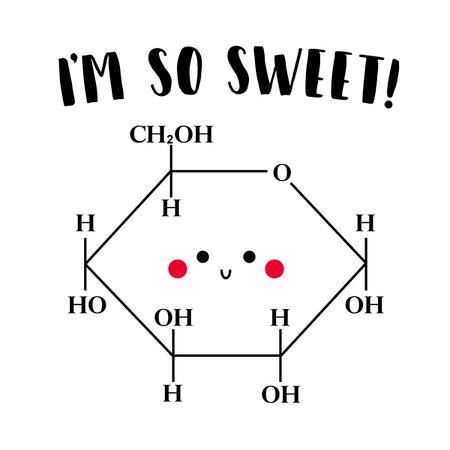
Source
[ ]
]
Glucose is a simple sugar with the molecular formula C 6 H 12 O 6 , which means it is a
molecule that is made of six carbon atoms , twelve hydrogen atoms, and six oxygen atoms..
**Glucose also circulates in the blood of animals as blood sugar.
It is made during photosynthesis from water and carbon dioxide, using energy from sunlight. It is also the most important source of energy for cellular respiration.
**Glucose is stored as a polymer.
In plants it is stored as starch and in animals as glycogen .
Furthermore Glucose comes from the Greek word for "sweet." And It's a type of sugar you get from foods we eat, and your body uses it for energy. As it travels through our bloodstream to our cells, it's called blood glucose or blood sugar.
Also with fat, glucose is one of the body’s preferred sources of fuel in the form of carbohydrates. We can get glucose from bread, fruits, vegetables, and dairy products. We need food to create the energy that helps keep us alive.
How does the body process glucose?
It comes from foods rich in carbohydrates, like bread, potatoes, and fruit. As we eat, food travels down to the esophagus to our stomach. There, acids and enzymes break it down into tiny pieces. During that process, glucose is released.
It goes into our intestines where it's absorbed. From there, it passes into our bloodstream. When it enters the blood, insulin helps glucose get to our cells.
Our body processes glucose multiple times a day, ideally.
When we eat, our body immediately starts working to process glucose. Enzymes start the breakdown process with help of the pancreas. The pancreas which produces hormones including insulin, is an integral part of how our body deals with glucose. When we eat, our body tips the pancreas off that it needs to release insulin to deal with the rising blood sugar level.
**Insulin can be said to be a hormone that moves glucose from your blood into the cells for energy and storage. Some people can’t rely on their pancreas to jump in and do the work it’s supposed to do.
**what happens when pancrease dose not release insulin??
One way diabetes occurs is when the pancreas doesn’t produce insulin in the way it should. In this case, people need outside help (insulin injections) to process and regulate glucose in the body. Another cause of diabetes is insulin resistance, where the liver doesn’t recognize insulin that’s in the body and continues to make inappropriate amounts of glucose. The liver is also an important organ for sugar control, as it helps with glucose storage and makes glucose when necessary.
People with diabetes have higher-than-normal levels in their blood. they don't have enough insulin to move it through or their cells don't respond to insulin as well as they should.
High blood glucose for a long period of time can damage our kidneys, eyes , and other organs.
Result in the release of free fatty acids from fat stores is due to the fact that the body doesn’t produce enough insulin This can lead to a condition called ketoacidosis.
Functions
**It is used as an energy source in most organisms, from bacteria to humans, through either aerobic respiration, anaerobic respiration , or fermentation.
**Glucose is the human body's key source of energy, through aerobic respiration, providing about 3.75 kilocalories (16 kilojoules ) of food energy per gram.
**Breakdown of carbohydrates (e.g., starch) yields mono- saccharides and disaccharides most of which is glucose.
**Glucose supplies almost all the energy for the brain ,so its availability influences psychological processes. Because When glucose is low , psychological processes requiring mental effort (e.g., self-control , effortful decision-making) are impaired.
Testing of glucose
Testing glucose levels is very important for peoplesuffering from diabetes. Most people with the condition are used to dealing with blood sugar checks as part of their daily routine.
The simple way to test for blood test: use a finger prick, we can as well use a , small needle called a lancet, produces a drop that is put onto a test strip. The strip is put into a meter, which measures blood sugar levels. It can usually give you a reading in under 20 seconds.
Normal levels for glucose
Maintaining glucose levels near the normal range is an important part of keeping your body running effectively and healthily.
People who have diabetes have to pay special attention to their glucose levels. Before eating, a healthy range is 90–130 milligrams per deciliter (mg/dL). After an hour or two, it should be less than 180 mg/dL.
There are a variety of reasons that blood sugar levels can shoot up. Some triggers include:
A heavy meal
stress
other illness
lack of physical activity
missed diabetes medications
What should we do if our levels are too high or low
In situations where your glucose level is too high, insulin will help to bring it down. For people with diabetes, too-high blood sugar is a sign that they may need to administer synthetic insulin. In less serious situations, physical activity can help lower your levels.
A glucose level is considered to be too low when it dips under 70 mg/dL. This condition is also known as hypoglycemia, and it has the potential to be very serious. Hypoglycemia can occur when people with diabetes skip their medication. It can also occur when people are eating less than normal and exercising excessively. Eating a meal or drinking juice can help to increase glucose levels. People with diabetes also often take glucose pills, which can be purchased over-the-counter at a pharmacy.
It’s possible for low blood sugar to result in a loss of consciousness. If this occurs, it’s important to seek out medical care.
What happens if your levels go unregulated?
There are long-term consequences for unregulated glucose levels. It can lead to a variety of conditions, including:
neuropathy
heart disease
blindness
skin infections
problems in the joints and extremities, especially the feet
severe dehydration
coma
More serious complications include diabetic ketoacidosis and hyperglycemic hyperosmolar syndrome , both conditions related to diabetes.
People who are worried that they may have diabetes should seek immediate help from a doctor.

Source
[https://www.neatoshop.com/product/Glucose]
Finally, it’s easier to deal with glucose issues before they get too advanced. Healthy glucose levels are an important part of keeping a body working at its best. Eating a healthy, well-rounded diet, supplemented with exercise is essential.
For some people, though, this isn’t enough. People with diabetes have trouble maintaining healthy and consistent glucose levels. A course of treatment can help. People with diabetes should also closely monitor their glucose levels, since the condition increases the risk of glucose-related medical issues.
Refrence
(https://www.healthline.com/health/glucose)
(https://www.webmd.com/diabetes/glucose-diabetes)
(https://en.m.wikipedia.org/wiki/Glucose)
Glucose is very important indeed.
Yea bro
Thanks boss